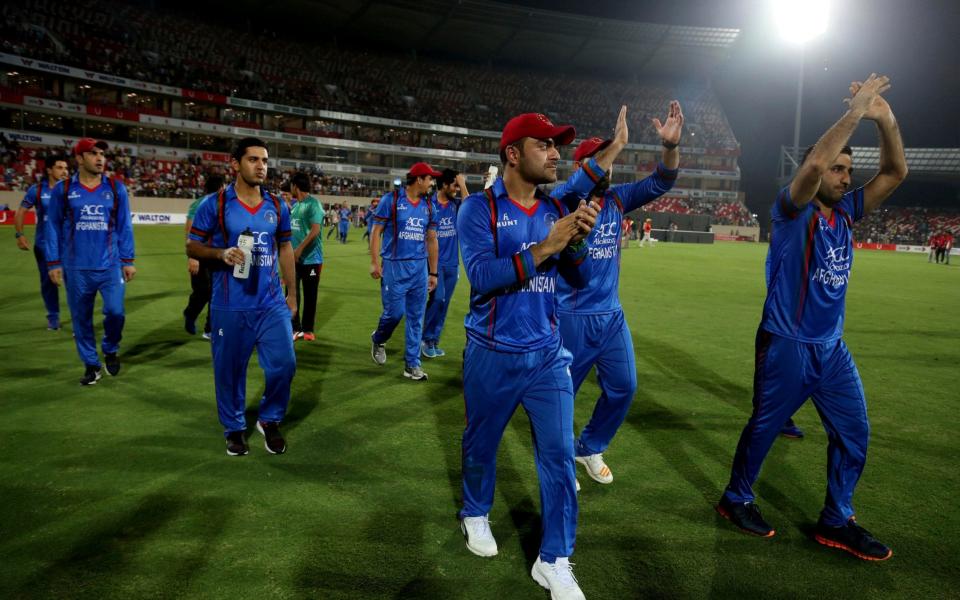Afghanistan have unlimited potential as they prepare for inaugural Test against India

What is the best thing that has ever happened to cricket? Afghanistan’s unprecedented growth is as good an answer as any.
Ireland, who became the 11th Test-playing country last month, have limited potential to grow in the short term. Afghanistan, who will become the 12th on Thursday, have unlimited potential - or so their trajectory suggests.
Not a formal game of cricket was staged in the country 20 or even 15 years ago, it was simply played in refugee camps in Pakistan, yet this week they will take on the world champions India.
Ireland made a plucky start by holding Pakistan for most of their inaugural Test on a slow Dublin pitch; and it was much the same when Bangladesh in 2000 and Zimbabwe in 1992 made their debuts, both at home as well, before grim reality set in.
No such initiation for Afghanistan, who will never play at home in the foreseeable future, owing to the security situation in their country; and facing the world number one Test team in Bangalore is likely to be a let-down, as what Afghanistan’s cricketers have least experience of is batting patiently all day, which India’s batsmen are wont to do.

Afghanistan’s cricketers will bounce back however. The essence of their spectacular rise, without parallel in this sport’s history, is that they fearlessly hurdle obstacles. They were down and out in the World Cup qualifying tournament in Zimbabwe earlier this year, their chance of reaching the last 10 in England next summer only theoretical: yet they won every remaining game, and not only qualified for the World Cup but defeated West Indies in the final.
Their fearless and physical style is unique but if it has to be compared to any other, it would be to that of West Indies half a century and more ago. Coaching does not play the same prescriptive role in an Afghan cricketer’s development as it does in England or Australia. Hence the meteoric rise of bowlers who have their own unique style, like Mujeeb ur-Rahman, who is in line to make not only his Test debut this week but his first-class debut, at the official age of 17 years and 11 weeks, making him the first Test cricketer to be born in the C21st.
Yet Mujeeb has already made a name and a fortune for himself. He landed a $630,000 IPL contract and even if he got injured after a brilliant start, not to mention tax and the percentage paid to the Afghanistan Cricket Board, that still goes a long way in his native Khost. What else would a young Afghan want to do, to reach the top of society, except play cricket?

Mujeeb does everything that a traditional coach would forbid: he bowls not only an offbreak but every other kind of spinner as well, including googlies and carrom balls, all at a pace which deters the batsman from going down the pitch. Often with the new ball too. Half a century ago only a couple of hundred Englishmen could earn a livelihood by playing cricket, plus a few dozen players from overseas who spent the summer in northern leagues. T20 allows anyone anywhere to make a substantial living.
Mujeeb is following rapidly in the footsteps of Afghanistan’s wristspinner Rashid Khan, who earned a similar IPL contract and already, aged 19 officially, has 100 wickets in ODIs at only 14 each, so he is ranked the world number two in that format, and number one in the world T20 rankings. It looks like being a big toss on Thursday, and Afghanistan’s best hope is to get some runs on the board then trap India with their two young spinners as the pitch wears.
Afghanistan’s preparation for their inaugural Test was to swarm all over Bangladesh in a three-match T20 series, nominally at home, in the Indian hill-station of Dehradun. “I think it is a mental block which we have not been able to overcome,” said Bangladesh’s captain Shakib ul-Hasan after losing another close game to Afghanistan. But their cricketers seem to have no mental blocks. Rocketing up through the ICC divisions, where they were playing Jersey and Japan a decade ago, their experience is mainly of winning.

After their inaugural Test, several Afghans will head to England to play in the Vitality T20 Blast: Rashid Khan to Sussex, the former captain Mohammad Nabi to Leicestershire, and Mujeeb to Hampshire. There it will be quite a contrast between Mason Crane, bowling conventional wrist-spin, and Mujeeb with his own unique brand.
There are now 100,000 Afghans living in Britain. Many are refugees, young men who would put everything into cricket if given the chance, inspired by role-models like Mujeeb and Rashid, and too poor to afford the costs of club cricket, but ready to represent their adopted country. A national Afghan Cup tournament, subsidised by the ECB, even if only half-a-dozen games, would surely bring some astonishing talent to the surface, to be connected with mainstream clubs and counties.

